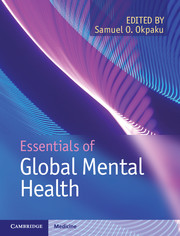Crossref Citations
This Book has been
cited by the following publications. This list is generated based on data provided by Crossref.
Trivedi, Premila
2014.
‘Nothing about us, without us’ – A user/survivor perspective of global mental health.
International Review of Psychiatry,
Vol. 26,
Issue. 5,
p.
544.
Kirmayer, Laurence J.
Lemelson, Robert
and
Cummings, Constance A.
2015.
Re-Visioning Psychiatry.
p.
1.
Rae, Sophie
2016.
Somali male refugees: Perceptions of depression and help-seeking.
Counselling Psychology Review,
Vol. 31,
Issue. 2,
p.
46.
O'Donnell, K.
and
O'Donnell, M. Lewis
2016.
Global Mental Health: sharing and synthesizing knowledge for sustainable development.
Global Mental Health,
Vol. 3,
Issue. ,
Jorge, Chuaqui
Debra, Rose Wilson
James, G. Linn
and
Emanuel, Arredondo
2017.
The role of the family in defining and managing disability of persons with schizophrenia in Chile: Meeting objective and subjective criteria of social inclusion.
International Journal of Sociology and Anthropology,
Vol. 9,
Issue. 12,
p.
166.
Islam, Sheikh Mohammed Shariful
Tabassum, Reshman
Colet, Paolo C
Cruz, Jonas Preposi
Dey, Sukhen
Rawal, Lal B.
and
Islam, Anwar
2017.
Workforce Development Theory and Practice in the Mental Health Sector.
p.
144.
Pratiwi, Ni Made Sintha
Zuhriyah, Lilik
and
Supriati, Lilik
2018.
EXPOSURE TO MASS MEDIA AS A DOMINANT FACTOR INFLUENCING PUBLIC STIGMA TOWARD MENTAL ILLNESS BASED ON SUNRISE MODEL APPROACH.
Belitung Nursing Journal,
Vol. 4,
Issue. 2,
p.
232.
Islam, Sheikh Mohammed Shariful
Tabassum, Reshman
Colet, Paolo C
Cruz, Jonas Preposi
Dey, Sukhen
Rawal, Lal B.
and
Islam, Anwar
2018.
Health Economics and Healthcare Reform.
p.
354.
Field, Sally
Abrahams, Zulfa
and
Honikman, Simone
2020.
Adolescent mothers: A qualitative study on barriers and facilitators to mental health in a low-resource setting in Cape Town, South Africa.
African Journal of Primary Health Care & Family Medicine,
Vol. 12,
Issue. 1,
González-Rodríguez, Alexandre
and
Seeman, Mary V.
2020.
Addressing Delusions in Women and Men with Delusional Disorder: Key Points for Clinical Management.
International Journal of Environmental Research and Public Health,
Vol. 17,
Issue. 12,
p.
4583.
Okpaku, Samuel O.
2021.
Innovations in Global Mental Health.
p.
3.
Okpaku, Samuel O.
2021.
Global Mental Health Ethics.
p.
81.
Gómez-Restrepo, Carlos
Cepeda, Magda
Torrey, William C.
Castro, Sergio
Uribe-Restrepo, José Miguel
Suárez-Obando, Fernando
and
Marsch, Lisa A.
2021.
El proyecto DIADA: un modelo de atención, basado en tecnología, para depresión y uso riesgoso de alcohol en centros de atención primaria en Colombia.
Revista Colombiana de Psiquiatría,
Vol. 50,
Issue. ,
p.
4.
Okpaku, Samuel O.
2021.
Innovations in Global Mental Health.
p.
273.
Okpaku, Samuel O.
2021.
Innovations in Global Mental Health.
p.
1.
Okpaku, Samuel O.
2021.
Innovations in Global Mental Health.
p.
1.



